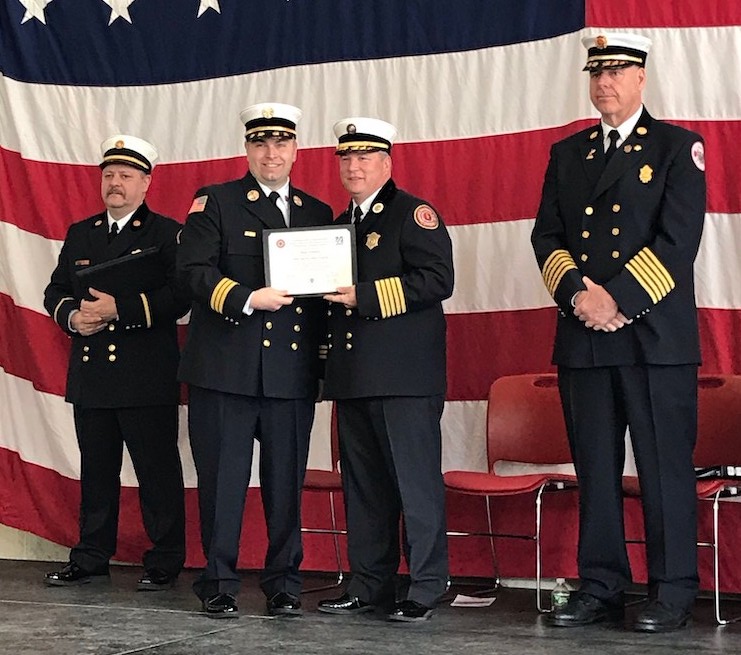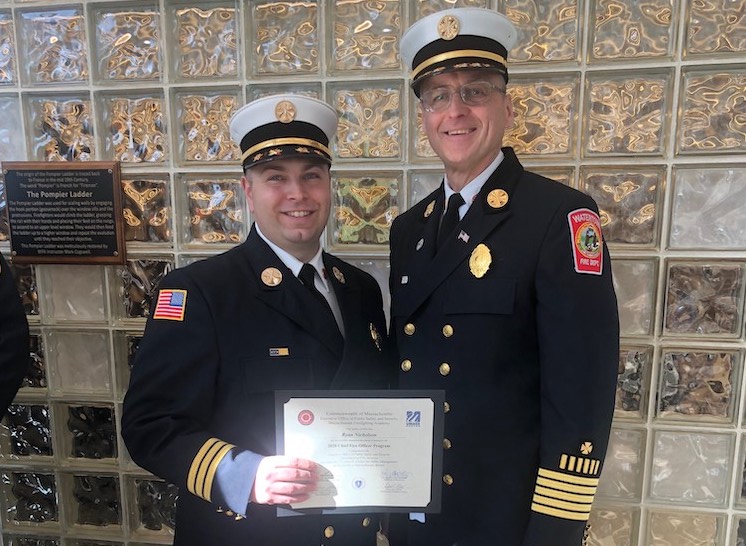
Watertown Deputy Fire Chief Ryan Nicholson recently graduated Massachusetts Firefighting Academy’s Chief Fire Officer Management Training Program.
Attendees of the 14-week program learned about the management fire departments not related to fire-suppression.
As part of the course, Nicholson had to write a research paper that identified a problem or challenge facing the Watertown Fire Department in which he proposed a solution. He then had to present the proposal to be considered by a panel of municipal officials.
Nicholson was promoted from Fire Captain to Deputy Chief in February 2019. He joined the Watertown Fire Department in 2006, was promoted to lieutenant in 2011, and made captain in 2013.
The following information was released about the Chief Fire Officer Management Training Program:
On Friday, January 31, 2020, 37 fire service leaders from across Massachusetts graduated from the 27th offering of the Massachusetts Firefighting Academy’s Chief Fire Officer Management Training Program. This 14-week program was developed in accordance with National Fire Protection Association Standards for senior fire officers. It is delivered jointly by the Edward J. Collins Jr. Center for Public Management at the University of Massachusetts and the Massachusetts Firefighting Academy. It is a comprehensive course providing training in the non-fire suppression aspects of managing fire departments.
State Fire Marshal Peter Ostroskey said, “These fire service leaders are committed to continually develop their management and leadership skills in order to provide the highest level of service to the communities they protect.”

The 37 graduates serve the following fire departments: Agawam, Barre, Bridgewater, Brockton, Cambridge, Carlisle, Charlton, Chilmark, Dennis, Fall River, Foxborough, Hanson, Hatfield, Haverhill, Hudson, Ipswich, Lexington, Littleton, Lynn, Massport, Merrimac, Monson, Newton, Northbridge, Paxton, Shirley, Southbridge, Southwick, Springfield, Waltham, Watertown, Wellesley, West Bridgewater, Westfield, and Whitman.
The curriculum covers a spectrum of topics considered essential for effective public sector management. It includes human resource management, ethics, executive leadership and legal issues, governmental and organization structures, information management, customer-focused strategic planning, legal aspects, budgets and public finance, community awareness and labor relations.
The Chief Fire Officer Management Training Program expects to help fire officers improve their ability to lead and manage personnel and the department, to provide skills to understand employees’ needs and problems, to promote personal productivity, to increase the capacity to manage both human and technical resources, and to increase inter-agency cooperation.
Participants are required to write a formal applied research paper that identifies a current problem or challenge faced by their organization and proposes a viable solution. The officers must then present their proposal to a panel of municipal officials for their consideration.
The Massachusetts Firefighting Academy, a division of the Department of Fire Services, offers this program, tuition-free.